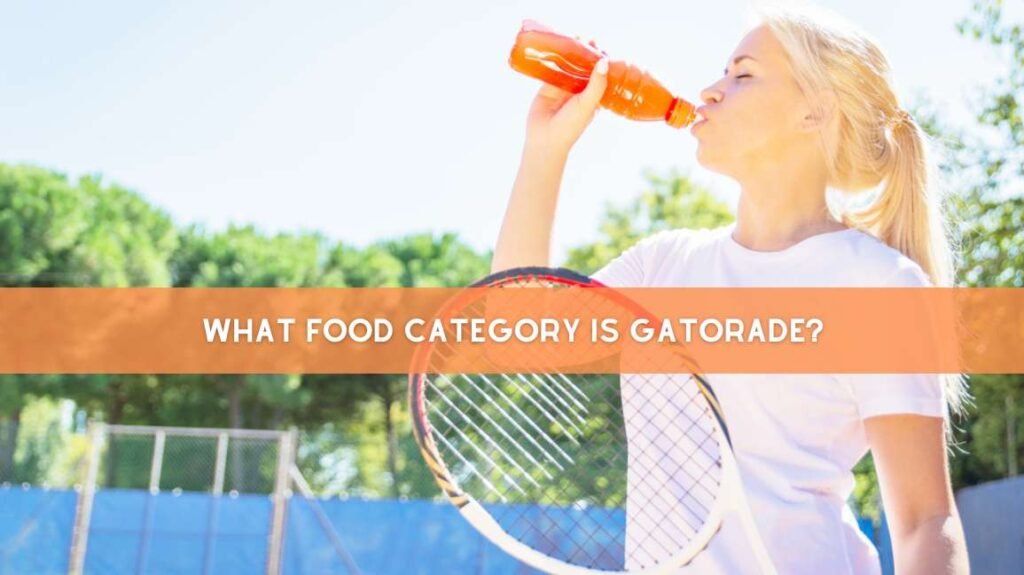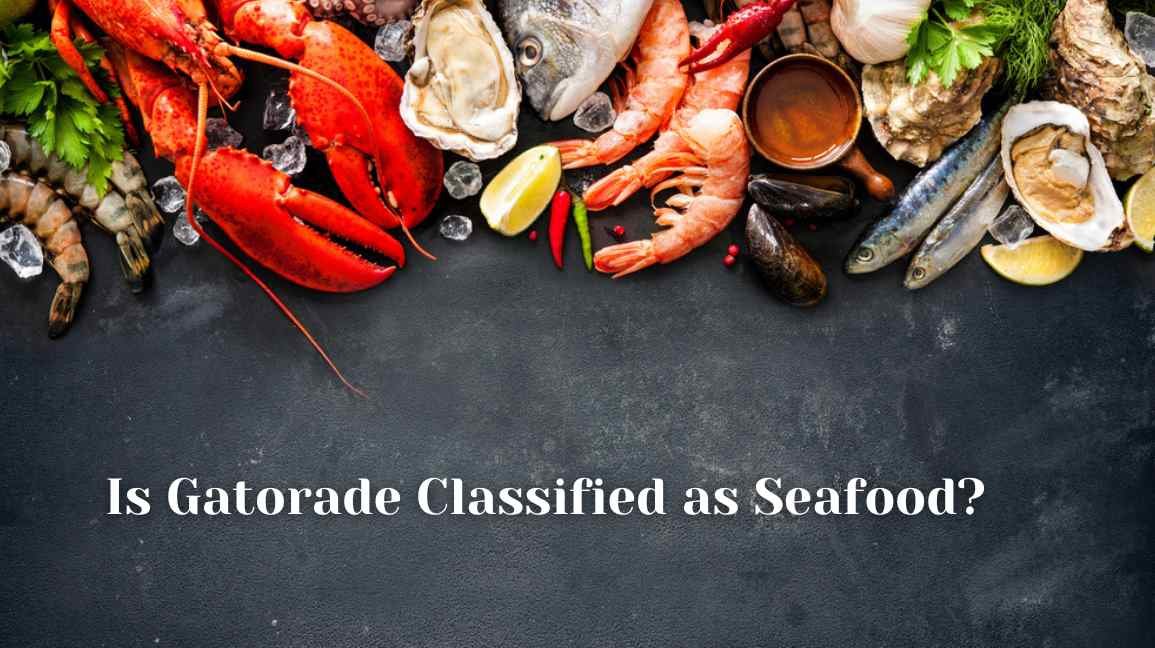The classification of consumable products often leads to intriguing debates – some are simple to understand, while others can be quite confusing.
One funny and genuinely curious question that often comes up is whether Gatorade, a popular sports drink, could be classified as seafood. At first look, the question may seem silly because Gatorade is a drink without alcohol. It has electrolytes and sugars that help you stay hydrated and replenish your energy when you’re doing physical activities.
But why are we asking this? Well, it all comes down to the ingredients in this popular beverage and their potential connection to the marine world. Join us as we explore this topic and uncover the surprising links between Gatorade and seafood.
What is Gatorade?
Gatorade is a popular sports drink developed in the 1960s by researchers at the University of Florida. Named after the university’s football team, the Gators, this drink was created to restore the energy and nutrients lost during physical activity.
The main ingredients are water, sugar, citric acid, natural flavor, salt, sodium citrate, and monopotassium phosphate. Now, these ingredients may not seem to have a connection with seafood, but if we examine the electrolytes used, it might make you curious.
Definition and examples of seafood
Seafood is a term that is mainly used to describe any form of sea life that humans consider as food. This includes various species of fish and shellfish (crustaceans and mollusks). In some cultures, edible sea plants, like seaweed, are also considered seafood.
Seafood is lauded for its health benefits, as it is a primary source of protein, vitamins, and minerals. Also, certain types of fish are rich in Omega-3 fatty acids, which are known to promote heart health.
Now, how does this tie back to Gatorade? At first glance, it doesn’t. There are no fish, shellfish, or seaweed in Gatorade. However, the curiosity arises from the electrolytes used in the drink, which are essentially salts – and salts are typically obtained from seawater.
Is Gatorade classified as seafood?
No, Gatorade is not classified as seafood. While it’s true that Gatorade contains salts as electrolytes, and salts are often acquired from seawater, this connection alone doesn’t warrant classifying Gatorade as seafood.
Seafood refers to aquatic organisms that are consumed as food by humans, usually fish and shellfish. Gatorade, as a sports drink, doesn’t contain any such organisms or any other seafood-derived ingredients. Therefore, it wouldn’t be accurate or appropriate to classify Gatorade as seafood.
Also Read: Can I Drink Gatorade While Taking Antibiotics? Drink Hacks
What food category is Gatorade?
Gatorade is classified under the category of “Sports Drinks”. According to Harvard T.H. Chane, sports drinks are designed to replenish fluids, electrolytes, and energy that are lost during extensive or intense physical activity.

Gatorade, with its broad spectrum oingredients known for rehydration and energy replenishment, fits into this category perfectly.
It is primarily consumed by athletes and individuals who engage in prolonged physical activities, as the beverage aids in maintaining their performance levels and prevents dehydration.
Hence, while its electrolytes may originate from sea salts, it does not change its classification from a sports drink to a seafood product.
Gatorade Nutritional profile
According to the USDA FoodData Central, an 8-ounce serving of Gatorade’s most popular flavor, Lemon-Lime, contains the following:
- Calories: 50
- Carbohydrates: 14g (5% of the daily value)
- Sugars: 13g (26% of the daily value)
- Sodium: 110 mg (5% of the daily value)
- Potassium: 30 mg (<1% of the daily value)
It’s important to note that Gatorade is a high-calorie drink, mostly from sugars. These sugars, along with electrolytes like sodium and potassium, provide quick energy during intense exercise.
Note that the nutritional profile can vary slightly between flavors and versions of Gatorade. Always check the product label for the most accurate nutritional information.
Ingredients
The main ingredients in Gatorade are:
- Water
- Sugar
- Dextrose
- Citric Acid
- Natural Flavor
- Salt
- Sodium Citrate
- Monopotassium Phosphate
- Modified Food Starch
- Glycerol Ester of Rosin
- Yellow 5 (for color)
- Brominated Vegetable Oil
While some of these ingredients may seem unfamiliar, they are all commonly used in food and beverage products.
How Gatorade ingredients compare to seafood characteristics
Although Gatorade and seafood are vastly different on the surface, a deeper examination of their characteristics and components can yield some interesting comparisons.
- Electrolytes: As mentioned earlier, Gatorade contains electrolytes, which are minerals that carry an electric charge. They are critical for several bodily functions, including maintaining fluid balance, nerve signaling, and muscle contractions. Seafood, especially shellfish, is also rich in electrolytes. For example, shrimp and oysters are high in sodium, an essential electrolyte.
- Protein: Seafood is renowned for its high protein content, a nutrient crucial for muscle repair and growth. Gatorade, however, contains minimal protein, as its primary function is rehydration and quick energy replenishment rather than muscle recovery.
- Vitamins and Minerals: Seafood is a rich source of various vitamins and minerals, including Vitamin B12, zinc, and iodine. In contrast, Gatorade primarily contains sodium and potassium and lacks the wealth of nutrients found in seafood.
Absence of seafood components
Gatorade, despite its electrolyte content, does not contain any components which usually associated with seafood. It lacks omega-3 fatty acids, a nutritious compound abundant in many types of fish that is known to support heart health.
It also does not contain any source of dietary protein, which is a primary nutritional attribute of seafood.
Furthermore, Gatorade does not provide the wealth of vitamins and minerals found in seafood, such as Vitamin D, Vitamin B12, zinc, and iodine. So, while Gatorade can help with rehydration and energy during intense physical activity, it doesn’t provide the same nutritional benefits as eating seafood.
Examining the FDA’s criteria for classifying seafood.
The Food and Drug Administration (FDA) has specific criteria for categorizing food products as seafood.
Primarily, the product must be derived from aquatic animals or plants. This includes fish, shellfish, and seaweeds that are consumed by humans. The FDA also considers the product’s manufacturing, processing, and packaging processes before classifying it as seafood.
Further, the presence of specific nutrients like omega-3 fatty acids, which are abundant in many types of seafood, is also taken into account. Importantly, the product must be safe for consumption, meeting all the FDA’s safety and quality standards.
When it comes to Gatorade, although it has some salts that might come from seawater, it doesn’t meet the FDA’s requirements to be considered seafood.
The drink is not derived from aquatic organisms, is not processed in the same manner as seafood, and does not provide the same range of nutrients typically found in seafood. Therefore, it remains classified as a sports drink.
Expert opinions on Gatorade as seafood
Leading nutritionists and dietitians have weighed in on the Gatorade and seafood topic.
According to Dr. Roberta Anding, a registered dietitian and Director of Sports Nutrition at Baylor College of Medicine, “While Gatorade does contain electrolytes, its classification remains a sports drink. Seafood is a category reserved for food derived from marine life.”
Similarly, Dr. Lisa Young, a nationally recognized nutritionist, and author of ‘Finally Full, Finally Slim’, asserts, “Gatorade is a hydration beverage, not a food, let alone a seafood. Its main components are water, sugars, and electrolytes, which are designed to replenish those lost during intense physical activity.”
These expert opinions confirm that, even though Gatorade contains electrolytes, it cannot be classified as seafood.
Conclusion
In conclusion, Gatorade is a popular sports drink, designed mainly to provide hydration and quick energy during intense physical activity.
While it contains electrolytes, often derived from salts that are sometimes sourced from seawater, this does not classify Gatorade as seafood. Therefore, while both Gatorade and seafood can support aspects of human health, they do so in markedly different ways and fit into separate food categories.
In simple terms, Gatorade is a drink that helps you stay hydrated and replenish energy during sports, while seafood is a nutrient-rich food group that is important for a balanced diet.
FAQ
What classification does Gatorade have from the FDA?
The Food and Drug Administration (FDA) classifies Gatorade as a “Beverage” under the category of “Non-Alcoholic Beverages and Brewed Soft Drinks”. Specifically, it falls under the subcategory of “Sports and Energy Drinks”.
Does Gatorade have mercury?
No, Gatorade does not contain mercury. Mercury is a heavy metal that is not used in the production of Gatorade or any of its ingredients. Consuming mercury can lead to serious health problems, so it is not permitted in food and beverage products.
Is Gatorade okay for kids?
Yes, Gatorade is generally safe for children to consume, especially if they’re involved in intense physical activity. However, it should be limited as it contains high amounts of sugar. It’s not recommended for regular hydration needs, where water is the best option.
Is Gatorade good for pregnancy?
Gatorade can be consumed during pregnancy for quick rehydration and energy replenishment, especially during bouts of morning sickness that may cause dehydration. However, due to its high sugar content, it should be consumed in moderation and should not replace water for regular hydration needs.

